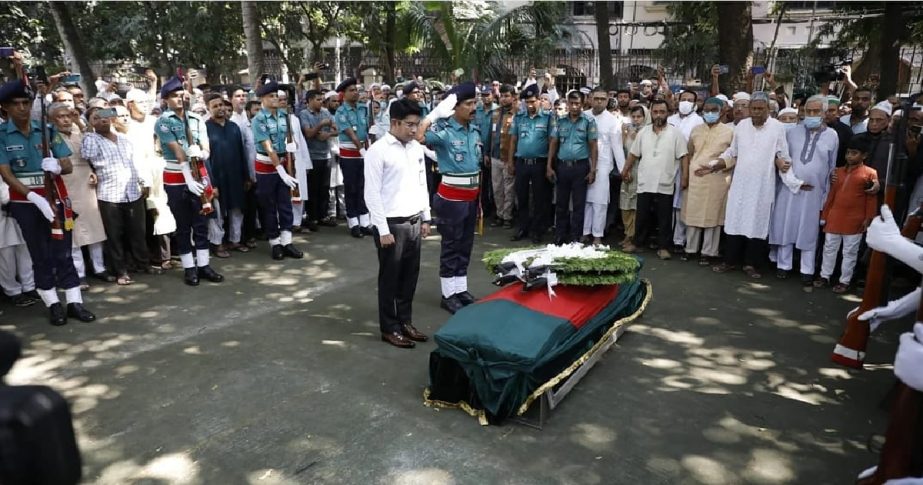
UNB, Dhaka :
Former advisor to the caretaker government and economist Dr Akbar Ali Khan was laid to rest at the city’s Martyred Intellectual graveyard in Mirpur on Friday afternoon.
His Namaz-e-janaza was held at Azad Mosque in Gulshan after Jumma prayer. After the Janaza, he was given a guard of honor by the district administration in the mosque premises.
Planning Minister MA Mannan, Cabinet Secretary Khandkar Anwarul Islam, Gonoshasthaya Kendra (GK) Founder and Trustee Dr Zafrullah Chowdhury and former NBR Chairman Badiur Rahman took part in his janaza among others.
Earlier in the day, the body of Akbar Ali Khan was taken to his residence in Gulshan where his relatives, prominent personalities and cross section of people paid their last respect.
Akbar Ali passed away in Dhaka Thursday night following a prolonged illness. He was 78.
Foreign Minister AK Abdul Momen, Dhaka University Vice-Chancellor Prof Dr Md Akhtaruzzaman and different organisations including Transparency International Bangladesh (TIB) and Bangladesh Economic Association expressed shock and deep sorrow at his death.
Akbar Ali Khan was born in 1944 at Nabinagar in the Brahmanbaria district. He studied history at Dhaka University and secured first place in first class in both BA and MA exams. He studied economics at Queen’s University Canada and obtained MA and PhD in economics.
He joined the Civil Service of Pakistan (CSP) in 1967. He actively participated in the Liberation War and was sentenced to 14 years’ imprisonment in absentia by a military court of the occupation forces. He joined the provisional government of Bangladesh as deputy secretary, Ministry of Defense.

Akbar Ali served with distinction in various ministries. He worked at the Ministry of Finance for more than 16 years at levels of joint secretary and above. He was chairman of the NBR and secretary of the Internal Resource Division for nearly three years.
Akbar Ali served as finance secretary for more than five and half years covering three consecutive governments. He was appointed the cabinet secretary in 2001 and retired from that position in 2002.
He was an advisor in charge of the ministries of finance, planning, commerce, post, telegraph and telephones in the caretaker government in 2006 and resigned in protest against the failure of the chief advisor in ensuring a free, fair and impartial election. He also served as the first chairman of the Regulatory Reforms Commission during 2007-2009.
Dr Khan served as minister (economic) at Bangladesh Embassy in Washington DC for four years from 1987-1991. He was the alternative executive director of the World Bank for more than three years, as the representative of the governments of Bangladesh, Bhutan, Sri Lanka and India.
He was elected chairman of the 42-nation FAO sub-committee on Surplus Disposal (Food Aid) for the year 1989. He was elected Vice Chairman of the Officials Committee of the UNCTAD Trade Summit in Columbus, Ohio in 1995.
He has published 14 books and several articles on economics, history, public administration, literature and water resources in various national and international journals. His first book “Some Aspects of Peasant Behavior in Bengal” was praised by The Journal of Economic History (USA) as “a significant contribution to the growing body of new economic history in South Asia.”
Dr Khan’s book “Discovery of Bangladesh” was rated by the Asiatic Society of Bangladesh as the best publication in humanities for the period 1996-98 and was awarded the Justice Md Ibrahim gold medal. His book “Parathaparatar Arthaniti” was highly commended for its wit and originality by Desh – the most widely circulated literary magazine of Kolkata.
His book “People’s Participation in Budgetary Process in Bangladesh: In Search of Policy Reforms” was published in 2008 by Shamunnay – a national advocacy NGO.
He was elected fellow of Bangla Academy in 2010 in recognition of his contribution to the economics and history of Bangladesh.

